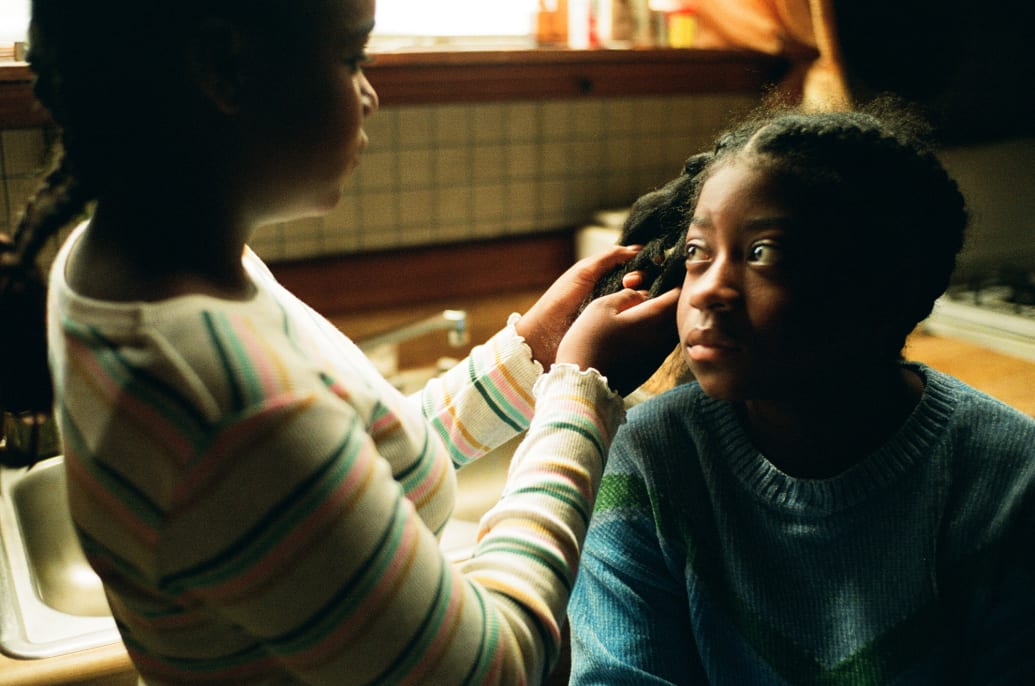Three of the year’s most lauded films, each written and directed by Black women, expose the beauty and heartbreak of being a Black mother in America. In Savannah Leaf’s gut-wrenching Earth Mama, a recovering drug addict weighs the future of her unborn child while trying to retrieve her two children from the foster-care system. In a refreshing approach, Leaf explores the precarious lives of poor, young mothers without making a spectacle out of these women’s hardships. There’s also AV Rockwell’s excellent A Thousand and One, which made a slightly bigger splash at this year’s Sundance Film Festival. Like Earth Mama, the movie highlights the foster-care system, if only to reveal several complicated realities for a mother and her son living in ’90s Harlem.
The last and most insular of the trio is Raven Jackson’s All Dirt Roads Taste of Salt, which screened at this year’s New York Film Festival on Monday. Set in rural Mississippi, the film gorgeously captures the stages of a woman’s adolescence, before she unexpectedly becomes pregnant by a childhood companion.
Distributed by A24 and co-produced by Barry Jenkins—and borrowing much of his visual aesthetic—All Dirt Roads is the type of painstakingly sumptuous film that prioritizes image and sound over story or character. That being said, I was somewhat grateful that I watched Earth Mama a few days before seeing All Dirt Roads as an accidental double feature. My residual thoughts about Earth Mama (although starkly different from All Dirt Roads in several ways) unfortunately added more texture to Jackson’s movie than it contained on its own. Even having personal experiences that mirrored those of the main character, Mackenzie, I struggled to drudge up the emotions the film wanted me to feel at every turn. Despite its potentially rich subject material, All Dirts Roads unfortunately gets lost in its own beauty, making for a stagnant and frustrating viewing experience.
Most of the 96-minute film depicts the somewhat reserved and observant “Mack” (portrayed by Charlee McClure in her later years) in seemingly mundane but impactful scenarios. In almost all of these slow-moving vignettes, she’s surrounded by the warmth of her tight-knit family or the innate beauty of Mississippi’s bucolic landscape. Without spoiling the film’s most striking images, we open with a closeup of Mack’s hand grazing the metallic scales of a fish while catching dinner with her father, Isaiah (Chris Chalk). In another scene, she receives a lesson on femininity by watching her mother Evelyn’s (Sheila Atim) makeup routine. Through her sister Josie (played by Moses Ingram as a young adult), who sets out on a more conventional path, Mack appreciates the beauty of tradition.
We watch Mack’s life unfold in the way these memories presumably exist in her mind, without any exposition or detail beyond what we see onscreen. In a movie like Aftersun, the protagonist’s vague memories and the opacity of Paul Mescal’s tragic character feel crucial to the film, as young Sophie tries to piece together who her father was. All Dirt Roads, however, never attempts to explore who Mack becomes as a woman and how her recollections have affected her. Without any interest in her interior life, it’s unclear why we should care that these events happened to her in the first place. On one hand, it’s refreshing that Jackson doesn’t go to melodramatic, predictable extents to convey her protagonist’s experiences. On the other, it feels like the movie is presenting parts of a math equation without any attempts to solve it.
Jayah Henry and Kaylee Nicole Johnson.
Jaclyn Martinez/A24
Instead, Jackson is more interested in visually presenting these characters and their surroundings through avant-garde techniques. Despite Jackson’s literary background as a poet, characters rarely speak, presumably so that the audience will have a more sense-driven experience. Sometimes, the film’s experimental camerawork and lavish soundscapes work. But for the most part, they’re not enough to make up for a rather thin story.
For instance, cinematographer Jomo Fray focuses on characters’ torsos, backs, and hands—there are more closeups on hands in this film than a Jergens commercial—rather than faces for a substantial amount of the film. In some scenes, this adds an appropriate level of mystery, as All Dirt Roads unfolds like a puzzle (but with no glimpse at the final product, unfortunately). In others, like a sequence where Mack tearfully embraces her childhood crush (Reginald Helms, Jr.) for several stretched-out minutes, it becomes tedious to the point where these tricks ultimately lose their magic. As the film goes on, these stylistic efforts read more as an attempt to make up for something the narrative lacks.

Charleen McClure.
Jaclyn Martinez/A24
For a story told non-linearly and at an extremely languid pace, one may expect more of an emotional pay-off than Jackon’s script provides. Speaking of which, the few scenes where characters do actually speak are oddly (but maybe not that surprisingly) the most effective and charming portions of All Dirt Roads. I spent most of the movie longing for more nervous, playful banter between Mack and Wood. And the brief, sentimental exchanges between Mack and her family members toward the end of the movie feel more potent than any of these quiet moments, even the most devastating ones, prior.
All in all, All Dirts Roads is a beautiful ode to lots of inarguably valuable things—childhood memories, first loves, first heartbreaks, motherhood, traditions, Black Southerners, Black families, Black communities, etc. Likewise, viewers’ reactions to this film will likely depend on their own experiences and the level of nostalgia they bring to it. Still, evocation, while important in any work of art, isn’t the sole measure of good filmmaking. I’m excited to see what else Jackson, who’s clearly capable of crafting compelling images, can create, though, once she moves beyond the surface.










